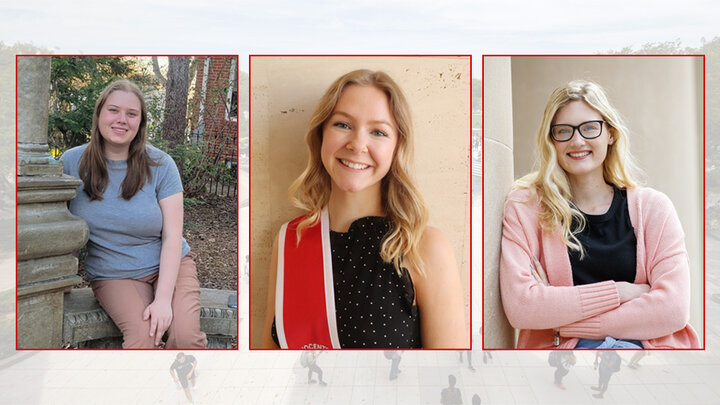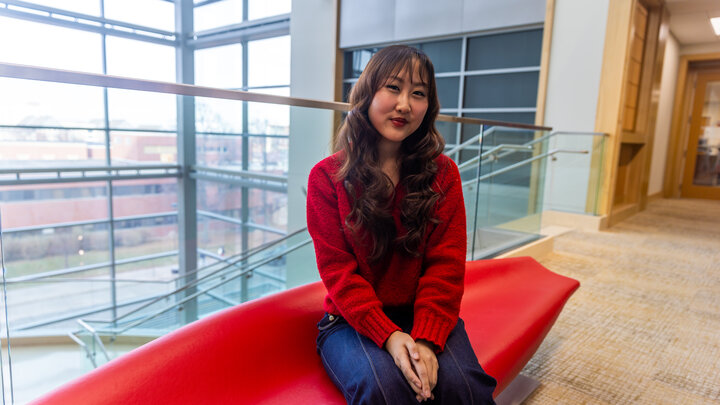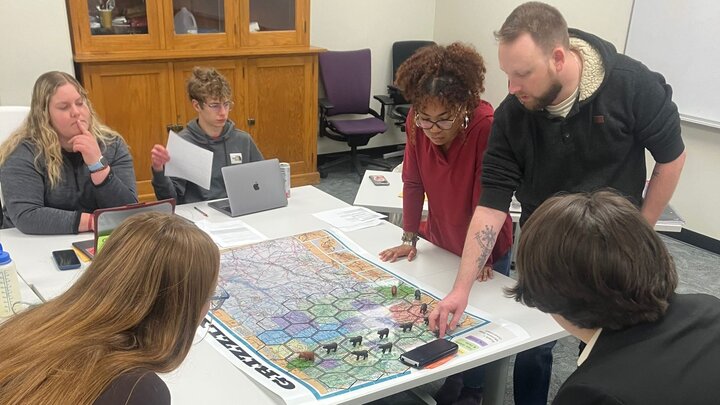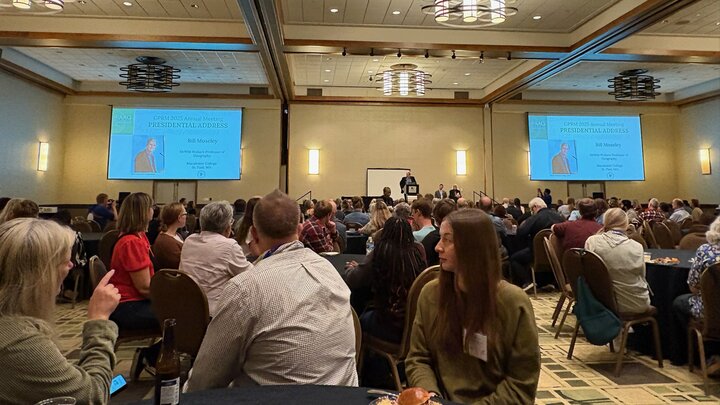The School of Global Integrative Studies is pleased to announce that Francine Mace, McKenzie Nelson, and Sadie Ritter—all students majoring in global studies—have earned Fulbright U.S. Student Program awards for the 2022-23 academic year.
The U.S.'s flagship international educational exchange program is designed to increase mutual understanding between the people of the U.S. and the people of other countries. Recipients are selected in an open, merit-based competition that considers leadership potential, academic and/or professional achievement and record of service. Since 1946, more than 400,000 participants from over 160 countries have studied, taught. conducted research, exchanged ideas, and contributed to finding solutions to shared international concerns.
"Every year we strive to prepare students to be global changemakers, and this year is no different," Emira Ibrahimpasic, assistant director of the Global Studies program, said.
Francine Mace
Majors: Global studies, political science, Latin American studies
Minors: Human rights and humanitarian affairs, Spanish, national security, and communication studies
Where are you going with Fulbright?
I will be an English Teaching Assistant at a teacher’s college in Argentina.
How did you first learn about Fulbright?
I learned about Fulbright when I first visited the University of Nebraska as a prospective student. It had always been my intention to start law school right after graduating, but because of the pandemic, I was unable to study abroad. I really enjoy teaching so I looked into teaching abroad programs and was encouraged by Emira Ibrahimpasic last summer to apply for Fulbright and other foreign teaching opportunities.
Why did you apply for Fulbright?
I became a teaching assistant in the Department of Physics and Astronomy in the Spring of 2022 after taking Descriptive Astronomy (ASTR 103) to satisfy my ACE 4 requirement. I was asked to be a teaching assistant for the following semester, and have loved working with students. I decided to apply to Fulbright because I wanted to continue teaching by sharing US cultural practices with Argentinians, improve my conversational Spanish, and build stronger connections with my extended family there.
What do you hope to get out of your experience with Fulbright?
One of the most important aspects of my Fulbright grant for me will be the potential impact that the experience has on my future endeavors. When I return, I plan to go to law school and become an immigration attorney, so being exceptionally proficient in Spanish is key for me. Another important aspiration from my Fulbright grant will be to become a better teacher. This experience will help me develop significant leadership skills that I can transfer into my career like public speaking, project management, and problem solving. Other aspects that I hope to get out of this experience are to build my confidence in living abroad, taking safe risks, and exploring this region of the world, as I have always wanted to have an extended stay in South America.
What was the process like and what advice do you have for students thinking about applying?
The overall application process was long and required a lot of forethought. You’ll need multiple letters of recommendations, two full essays, a few short essays, lots of personal information to gather, and potentially a language evaluation. My advice for students would be to start working on these application components as early as possible. Another piece of advice that I have would be for students to find a mentor, whether that be within the International and National Fellowship office or a professor that you have worked with. My mentor helped to hold me accountable and get everything done in time. She also gave great advice on the process, and kept my spirits high while waiting for the responses from the Fulbright commission.
McKenzie Nelson
Majors: Global studies and German
Minors: Conflict and conflict resolution studies, history, human rights and humanitarian affairs, Jewish studies, political science
Where are you going with Fulbright?
I am going to the state of Sachsen in Germany.
How did you first learn about Fulbright?
I first heard about Fulbright my freshman year in my Introduction to Global Studies class with Dr. Ibrahimpašić.
Why did you apply for Fulbright?
Fulbright offers a unique opportunity for me to live in a new country for a year and immerse myself in the culture. It also allows me to continue assisting non-native speakers in learning English.
What did you hope to get out of your experience with Fulbright?
I hope to vastly improve my German skills, while learning more about teaching languages and applying my knowledge from my thesis on inclusive teaching in language classrooms.
What was the process like and what advice do you have for students thinking about applying?
What was really helpful for me was starting the application process early and reflect not only on why you are applying to Fulbright but also why you chose the country you did. Also make sure to take advantage of the resources that you have like professors and the fellowships office when applying and if you're on the fence about applying go for it.
Sadie Ritter
Majors: Global studies and Russian
Minors: Spanish and political science
Where are you going with Fulbright?
Kazakhstan.
How did you first learn about Fulbright?
I've known about Fulbright ever since I was 16 after stumbling across it on the internet. I have been interested in applying ever since.
Why did you apply for Fulbright?
The Fulbright program emphasizes cultural exchange and understanding, providing a unique opportunity for me to learn about a different culture firsthand. I am eager to immerse myself in the local community, interact with people from diverse backgrounds, and gain a deeper understanding of the local language, customs, and traditions. I believe that this cross-cultural experience will broaden my perspective, increase my intercultural competency, and foster meaningful connections with people from different parts of the world. This will be especially useful for my career, as I would like to be a Foreign Service Officer in Public Diplomacy.
What was the process like and what advice do you have for students thinking about applying?
The process itself is not necessarily hard, but it is time consuming. You should start thinking about applying about a year in advance. Choose a country that you have a connection to (through travel, study abroad, research, etc.) and write about how that country and culture has influenced your personal development. Emphasizing your own story and perspective in your essays is crucial. Avoid generic language and strive to make your essays stand out by infusing them with your own voice, experiences, and reflections.
The program is supported by the U.S. Department of State and participating governments, host institutions, corporations, and foundations.




